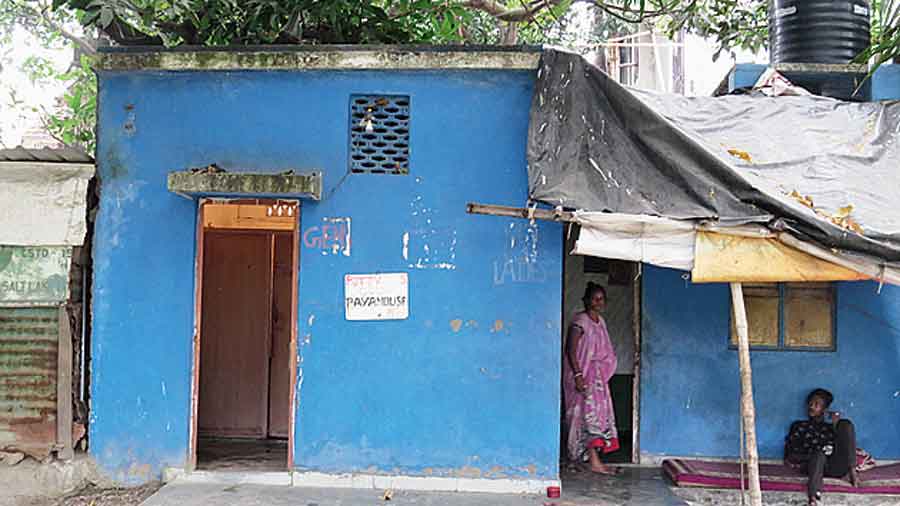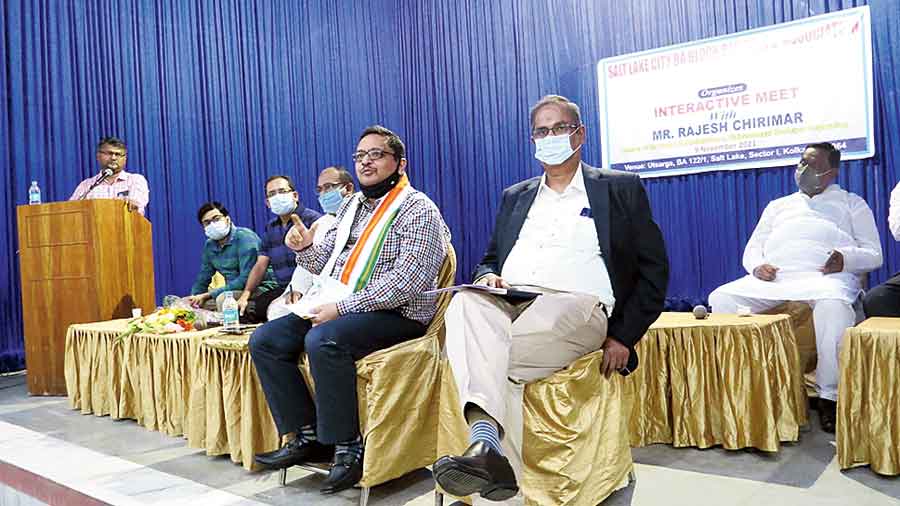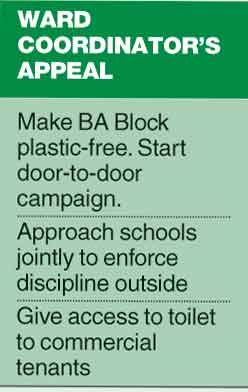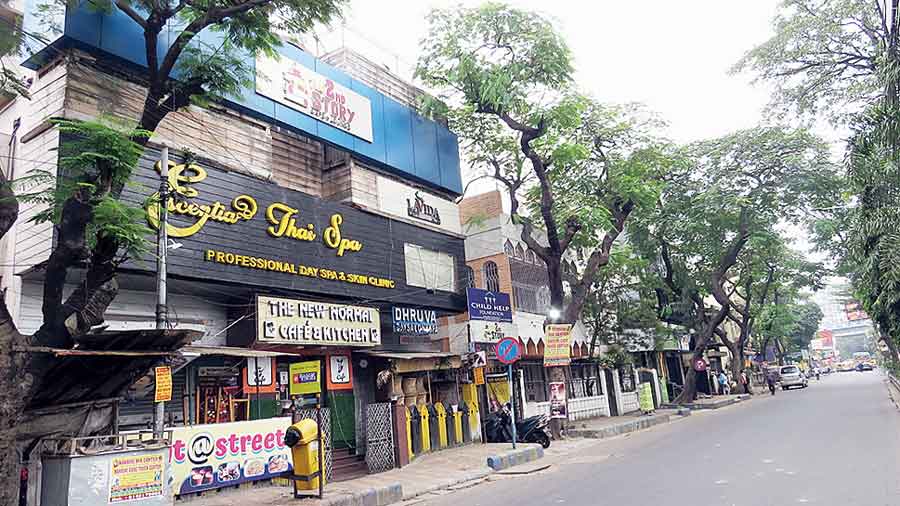The rampant commercialisation of residential plots in Salt Lake BA Block came under fire at an interactive meet with the ward co-ordinator organised by the block residents’ association last week. Several problems raised by the residents, it was pointed out, had its roots in the influx of outsiders in the block that stands at the entry point of Salt Lake via First Avenue.
“BA Block has become New Market,” stated Rajesh Chirimar, formerly the councillor of Ward 39 and now a member of the Bidhannagar Municipal Corporation’s Board of Administrators, overseeing civic affairs of the block.
“Out of 213 plots, you have showrooms in 40 houses and salons in 20 more,” Chirimar told the residents gathered to meet him at Utsarga, the block community hall. He mentioned specific premise numbers where multiple commercial establishments were running. “Even garages are being let out to sell chowmein and roll. They are dumping their waste in our drains.”
He shared an experience of posing as a customer and entering a salon in the block purportedly for a hair cut. “I asked the salon attendant sweeping the floor how they would dispose the chopped off locks as I knew our civic garbage cleaners did their rounds at 8am, long before the salon opened. The man complained that the sweepers came ‘too early’ and he was left with no option but to dump the locks directly in the gully pit!”
Chirimar pointed out that commercial establishments were supposed to enter into an agreement with the local civic body to get the garbage collected. “We charge just Rs 2 per kg for collection of waste. Once such an agreement is in place, the garbage collector would come in the afternoon to collect their litter. When I ask commercial establishments why they have not signed the agreement they shrug off the requirement, claiming they generate barely 2kg waste in a week!” he said.
Chirimar linked several complaints raised by the residents to the entry of outsiders in the block. Snehasish Ghosal spoke of water scarcity. Chirimar pointed out that people were expected to buy water if there was a social function in the house. “I myself did so twice recently when my house was being cleaned before Diwali. But what about the spas and salons running here round the year? Do they not consume water too?”
Toilet trouble
When Dilip Saha complained of public urination inside a children’s park opposite his house and Samarjit Guha voiced the need for a community toilet, the ward co-ordinator asked the block committee to suggest a spot in writing. “If I try to build a toilet on a spot of my choice, the residents of the adjacent buildings will immediately object. This has happened with placement of vats too. It is better that you reach a consensus first,” he said.
It emerged that most residents were unaware of the presence of two toilets in the block, including one inside BA-CA Park, next to the Salt Lake Cultural Society tent. “People urinate against the park wall instead of using the toilet inside,” he complained.
Chirimar proposed to approach the two schools in the block — Salt Lake School and Hariyana Vidya Mandir — once classes go offline to rein in their students and bus drivers from committing nuisance outside if the block committee members agreed to accompany him, which block president Arunava Das and others readily agreed to.
The civic body representative also objected to landlords renting out premises to commercial establishments without giving their employees access to the toilet. “They spend the whole day here. Where would they go to relieve themselves except in parks and other public places in the block?” He said he would raise the proposal at the next Board meeting of not allowing residential houses to do any commercial activity unless they had a toilet for the rented quarter.
Currently the major queries in the application to the land manager of the urban development department for receiving a no-objection certificate to use a residential building for non-residential purposes include the expected number of vehicles at peak hours, proposed plan with sketch map for parking of clients/customers and the garbage disposal plan.
According to a civic official, applicants used to take two copies of the application to the department, submitting one and getting the other stamped as received. It is the second that they submitted at the corporation, claiming that the NOC would be issued in a month, and the application was processed on its basis. The municipal authority is empowered to issue an enlistment certificate after consultation with the fire service authorities for a period of five years. “Now that everything is online, we accept the claims in the application with an element of trust,” the official added.
The urban development department has allowed non-residential use of up to 45 per cent of the floor area ratio of residential buildings since August 2014. The leaseholder has to pay Rs 80 per square foot as permission fees in addition to an application fee of Rs 500. Initially, 40 non-polluting, non-hazardous businesses were allowed on residential premises. The list of permitted businesses was extended to 60 in April 2015 on request from youths intending to start business from home.
“The rule was changed to help unemployed members of the family residing in the building. Now premises are being let out to mint money. I am against this rampant commercialisation,” Chirimar said. “Outsiders are parking their cars on your footpath, peeing in your parks and clogging your drains.”
Salt Lake, he pointed out, has 52 blocks where about 300 families were expected to reside. “But things have come to such a pass because of commercialisation that I am having to serve 30,000 people with 34 workers in the ward.”
The population in blocks with mushrooming commercial establishments, he pointed out, doubles at noon, like in Burrabazar. “Who is inviting this outsider influx? If I lodge a complaint and force their shutters down, some of you will complain against me that I disturb business. If you are unwilling to raise your voice against neighbours who are running businesses without requisite licences or flouting rules, how can I fight alone? How many people will I pick up fight with?”

The toilet in BA-CA Park. When The Telegraph Salt Lake visited the spot, the toilet, though operational, was difficult to locate because of lack of proper signage. The youths playing cricket inside seemed to be the only ones aware of its location. Pictures by Sudeshna Banerjee

Ward coordinator Rajesh Chirimar with block committee members at the BA Block community hall on November 9

Dengue scare
Dengue is a bigger phenomenon now than corona, the civic body representative said. Typhoid is also on the rise. “We fog an area every eighth day.” But the civic workers faced a problem of access in case the residents had left, leaving the property under lock and key, which could allow water to accumulate inside and mosquito to breed. “My workers will never ingress into a locked private property. I will issue a legal notice,” he said, mentioning a house the lessee of which stayed in a neighbouring block and his brother in BA Block.
He suggested to the block committee to stop taking Puja subscription from habitual offenders against whom complaints were being raised.
Rising road level
Another common complaint voiced by Subhadip Mondal was the level of the carriageway rising higher than the driveways of buildings, hindering smooth passage of cars out of garages and causing rainwater to recede inside instead of reaching the gully pits. “This year, there was so much water-logging that streetwater seeped into our reservoir,” he said.
Chirimar said the corporation planned to scrape layers of the asphalt coating before repair to tackle the problem of rising road levels. “Our corporation’s budget for roads is about Rs 10-12 crore. That leaves only Rs 25-27 lakh for each ward, which is not adequate. So we are dependent on the state government.”
Urban development minister Firhad Hakim, he said, had allocated funds thrice against detailed project reports submitted by the BMC in the last six years. “The latest allocation is about Rs 144 crore, which would leave about Rs 1.40 crore for Ward 39. But BMC has received only Rs 30 crore so far. We repaired some roads in February but had to stop for lack of funds. Patchwork repairs had to be done before the rains and the Puja.”
Block president Arunava Das said the committee wanted to create a model block. “We want to draw up a plan in consultation with everyone. This interaction with the ward co-ordinator was a step in that direction as we cannot achieve our goal without assistance from the civic authority and of all our residents.”
Write in to saltlake@abp.in
